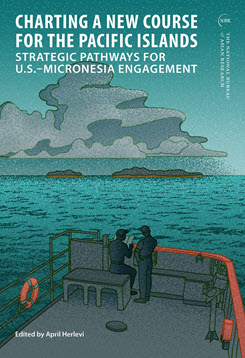Essay from NBR Special Report no. 104
U.S. Engagement in Micronesia: Lessons from Australia and New Zealand
This essay examines Australia’s and New Zealand’s engagement with the Pacific Island countries and offers lessons for the U.S.’s future engagement in the region.
EXECUTIVE SUMMARY
MAIN ARGUMENT
As the U.S. looks to revitalize its engagement in the Pacific Islands region through the U.S.-Pacific Partnership, and enhance its relationship with the Micronesian subregion in Compact of Free Association negotiations, it can learn from Australia and New Zealand, the partners that have long played the most active role in the Pacific. The successes and failures of Australia’s and New Zealand’s increased Pacific engagement suggest five lessons for the U.S.’s relationships in Micronesia: (1) be present in the region, particularly through diplomatic representation; (2) listen to Pacific Island states, particularly their concerns about the growing militarization of the region; (3) coordinate both between U.S. agencies and with partners to avoid duplicating efforts and overwhelming Pacific absorptive capacity; (4) recognize the importance of people-to-people connections, with opportunities to engage the Pacific diaspora and improve avenues for Pacific migration; and (5) be consistent in commitment and policy approach.
POLICY IMPLICATIONS
- When engaging in dialogue with Pacific Island states, the U.S. should invite representatives from U.S. territories in the Pacific to participate in order to deepen regional relationships through Indigenous and diasporic ties.
- To increase its engagement with the Pacific Islands, the U.S. must be present (when invited) at regional forums, listen to the concerns of Pacific Island states, develop relationships, and act with integrity.
- The U.S. should remember that the region is diverse. Each state has its own history, priorities, politics, and interests, and what works in one state might not work in another.
- Due to Pacific Island states often having small and poorly resourced public sectors, engagement must be coordinated across U.S. agencies to minimize duplication.
- When establishing capacity-building programs, the U.S. should assess existing programs and coordinate with both providers and recipients. Any new initiatives should address the specific needs and interests of the recipient rather than adopt a one-size-fits-all approach.
- The U.S. should consider how domestic policies, such as immigration pauses for seasonal work visas, may contradict its foreign policy of engaging more closely with the region.
Henrietta McNeill is a PhD candidate at Australian National University.
Joanne Wallis is Professor of International Security at the University of Adelaide.


